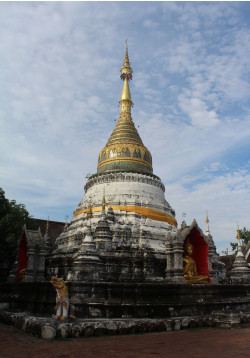Artwork Search
Arts in Southeast Asia Database
The Main Chedi
Keywords : Bell-shaped Chedi, Burmese art, Wat Buppharam
| Site common name | Wat Buppharam |
|---|---|
| Type of artwork | Architecture |
| Sub district | Chang Khlan |
| District | Mueang Chiang Mai |
| Province | Chiang Mai |
| Region | North |
| Country | Thailand |
| Geographic Coordinates Decimal degree | Lat : 18.787957 Long : 98.998197 |
| Geographic Coordinates UTM | Zone : 47 Q Hemisphere : N E : 499810.02 N : 2077365.65 |
| Place of artwork | At the south side of the Main Main Vihara |
| History of production | This temple was built in 2039 by King, Tilokarat, the villagers called it Wat Upa. But from the form, it should have been restored by Burmese craftsman in the 25th Buddhist Century |
|---|---|
| Production process | Masonry |
| Conservation | Announcing the registration of archaeological sites in the Government Gazette, Book 96, Chapter 145, dated August 21, 1979 |
| Art | This chedi is a bell shape chedi. It has square base with thirty-six corners. At the very bottom next to the floor appears the top edge of the balcony backboard. Next up is the three layers main base in the square plan, adding more angles which is a lotus base at the second and third floor. The corner is decorated with stupicas on the first and second floor and purnaghata(abundance pot) on the third floor. Next up is a two layers invers lotus base in an octagonal plan, three layers flat circular base, the bell, short cone shape spire and long minaret. |
| Key academic information | 1. The example of Burmese art chedi in Chiang Mai. 2. The example of Burmese art chedi blended with Mon art. |
| Notice | 1. Although the chedi of Wat Buppharam is a Burmese art, it has many features similar to the chedi in Mon art such as having a flat base in a circular plan, not using the supine lotus at the lotus base, may also include stressing the stupica at the base corner as well. The appearance of Mon influences may be due to the fact that this temple is in a Mon sect. 2. In addition to the style, it is a combination of Burmese art and Mon art. This chedi also shows the characteristics of the Chiang Mai school of art, which is a short cone shape spire but long minaret. 3. The appearance of the top of the balcony backboard rising from the ground may have been a clockwise yard around the chedi, but it has been covered in modern times. |
| Period | Historical Period |
| Art period | Myanmar |
| Age | 25th Buddhist Century |
| Religion | Buddhism |
| Sect | Theravada |
| Related artwork | 1. The Chedi of Wat Saen Fang, Chiang Mai province is an example of the Burmese art chedi of Chiang Mai school of art that has a form similar to the chedi of Wat Buppharam but does not appear an influence of Mon. 2. The Shwedagon Chedi, Yangon, Myanmar is an important chedi of the Mon people and there are some form that inspire the chedi Wat Buppharam. |
| Type of License | Attribution-NonCommercial-NoDerivs (CC BY-NC-ND) |
|---|---|
| Rights | Princess Maha Chakri Sirindhorn Anthropology Centre |
| Date of record creation | 2016-05-19 |
| Record creator | Rungroj Thamrungraeng |
| Bibliography | ศิลปากร, กรม. การขึ้นทะเบียนโบราณสถานภาคเหนือในเขตรับผิดชอบของหน่วยศิลปากรที่ 4 ตามโครงการสำรวจและขึ้นทะเบียนโบราณสถานของกองโบราณคดี. กรุงเทพฯ: กรม, 2525. เชษฐ์ ติงสัญชลี. รายงานการวิจัยฉบับสมบูรณ์ประเด็นใหม่เกี่ยวกับเจดีย์แบบมอญและพม่าในประเทศไทย. กรุงเทพฯ: ภาควิชาประวัติศาสตร์ศิลปะ คณะโบราณคดี มหาวิทยาลัยศิลปากร, 2554. สมหมาย เปรมจิตต์ และ อรุณรัตน์ วิเชียรเขียว. รายชื่อวัดและนิกายสงฆ์โบราณในเชียงใหม่. เชียงใหม่: ภาควิชาสังคมวิทยาและมานุษยวิทยา คณะสังคมศาสตร์ มหาวิทยาลัยเชียงใหม่, 2518. กองพุทธสถาน. ประวัติวัดทั่วราชอาณาจักร เล่ม 9 กรุงเทพฯ: กอง, 2533. |



